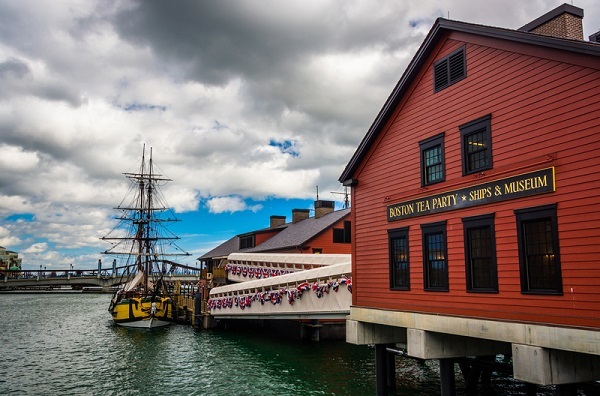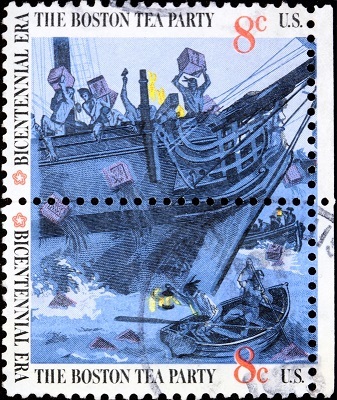

The Sons of Liberty organised the Boston Tea Party, a United States politics and business outrage, in Boston, Massachusetts, on December 16, 1773. The May 10, 1773, Tea Act, excluded the British East India Corporation from all tariffs that were enforced by the Townshend Acts and authorized them to sell tea leaves produced in China inside the United States territories.

Boston Tea Party
Description: Boston, Massachusetts is home to the Boston Tea Party Museum.
At the beginning of 1770, conflicts between both the British and the American colonists were already exceptionally high. On March 5, late during the day, a mob of Bostonians throwing snowballs and heckling assembled around some British troops defending the Boston Immigration Building.
The Boston Massacre, also known as the Encounter on King Street in Britain, occurred in Boston on March 5, 1770, when one company of nine British troops opened fire on five people who were mistreating troops and throwing various weapons. The incident was widely publicised as a "bloodbath" by prominent Republicans such as Paul Revere and Samuel Adams. Acting Governor Thomas Hutchinson eventually got the protesters to disband after an inspection, but the next day protesters rallied again, forcing the military to evacuate to Castle Island. Former US attorneys represented the eight detained troops, one officer, and four civilians accused of murder.
Numerous colonists tried to claim that the unsaid British legislature explicitly banned the carrying of a British defendant's real estate without the subject's cooperation.
The Boston Tea Party was a response issued on December 16, 1773, in Boston, Massachusetts, by a team of Patriot colonists affiliated with the Sons of Liberty. Through the Tea Act, Parliament granted the British East India Company a monopoly on tea sales throughout the colonies, preventing the company from closing down. Producing British tea became less expensive. In addition, a small tax was levied.
The Boston Port Act was the first act enacted in response to the Boston Tea Party in 1774. Boston's port had been closed until the colonists were compensated for the lost tea, and the monarch was overjoyed that everything was back in order. The Massachusetts Government Act sparked far more controversy than the Port Act because it dictatorially cancelled the state's charter and placed it under British rule.
If the Majestic Governor determined that the claimant grand official would not be able to obtain a fair trial in Massachusetts, the Executive of Justice Law gave him the authority to order that the trial take place in Great Britain or another part of the Empire. Following the Boston Massacre in 1770, British soldiers were given a fair trial, leading many colonists to believe that violence was unnecessary.
The Quartering Act, which was implemented in all British territories in North America, sought to standardise the way British troops were housed. The Quebec Act, which was also introduced during the same general assembly, was seen as another of the Intolerable Acts by the colonists. The Act appeared to overturn the Ohio Company's land titles in the area by enhancing the Quebec Province region across a significant portion of what is reportedly the American Midwest.
The colonists in America noticed that Britain was almost unreasonably charging them to conceal fees associated with the Indian and French War. Besides that, the American territories were never really legally recognized, colonists presumed Parliament had little power to deprive them.
In response to tea importation, the Assembly passed the Indemnity Act in 1767, repealing the tea tax and valuing British tea at the same level as Dutch-produced tea. Even though the Indemnity Act significantly reduced American tea emigration, the Townshend Revenue Act was passed in 1767. Tea now faces a brand-new penalty. Following that, the law proposed a tax on paper, glass, lead, oil, and paint. As a result of boycotts and rallies, the Townshend Revenue Act penalties on all goods except tea were repealed in 1770. The Tea Act, passed in 1773, gave the British East India Company exclusive rights to sell tea in the American colonies.
valuing British tea at the same level as Dutch-produced tea. Even though the Indemnity Act significantly reduced American tea emigration, the Townshend Revenue Act was passed in 1767. Tea now faces a brand-new penalty. Following that, the law proposed a tax on paper, glass, lead, oil, and paint. As a result of boycotts and rallies, the Townshend Revenue Act penalties on all goods except tea were repealed in 1770. The Tea Act, passed in 1773, gave the British East India Company exclusive rights to sell tea in the American colonies.
By countering the Tea Act, importers including John Hancock and Samuel Adams desired to shield their business interests. Samuel Adams pitched the Colonists on the belief that if citizens were taxed without recognition, civil dignity would be eradicated to support British tea.
The Boston Tea Party wouldn't be an illustration above a ramp-up in the additional tax on tea. In the meanwhile, it was an expression of the Townshend Revenue Act of 1767, carried by the British judiciary. Every commodity, notably paper, glass, oil, and paint, had also been subjected to new taxes demanded by the monarchy.
Britain's regulations against such colonies in the after-effect of the Boston Tea Party were still the proper reason for the dispute. In 1774, they conveyed a collection of rules recognised as “The Intolerable Acts”. They seemed to be legal avenues that would deform the colonies' expenses.
The Boston Tea Party was organised by American colonists in response to unrealistic British charges on the tea they preferred to drink. It is regarded as one of the pioneering movements in American history. During the Boston Tea Party in 1773, American colonists took over Boston Harbor to protest a British tax on tea. Shiploads of tea had been dumped further out at sea. The rivalry between America and Great Britain was heightened throughout this previously initiated battle, which had a significant impact. This escalating rivalry fueled the Revolutionary War, which erupted in 1775 and resulted in America's independence from Britain.
Q1. What's been demolished by the Boston Tea Party?
Ans. In today's currencies, the devastation that the Sons of Liberty created by smashing 340 boxes of tea was approximately over $1,700,000. The Boston Tea Party was estimated to even have cost the British East Indies Corporation £9,659 in penalties.
Q2. How crucial was indeed the Boston Tea Party?
Ans. The very first find the meaning of noncompliance by colonists in America has been the Boston Tea Party. The Boston Tea Party has major implications and an influence that eventually sparked the American Revolution, which commenced in Massachusetts on April 19, 1775.
Q3. What gave rise to the Tea Party?
Ans. The term “Tea Party” is a throwback to the Tea Party of Boston in 1773, which was gathered by colonists opposing British revenue with no representation. They decided to dump British tea seized from anchored merchants' ships as a sign of protest.